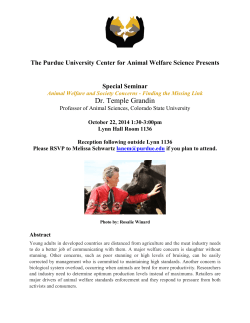
Demo Hour - ACM Digital Library
1 Electronic messages are encoded and transmitted mechanically via steel balls. 8 DEMO HOUR 12 W H AT A R E Y O U R E A D I N G ? 14H O W WA S I T M A D E ? 16 D AY I N T H E L A B ENTER DEMO HOUR 1. The Weight of Numbers This interactive installation transforms and sends messages via mechanical parts. Using a computer keyboard and a small LCD screen, participants first type a short message. After pressing Enter, the message is sent via steel balls to a monitor located three feet away. Every five steel balls carries an encoded five-digit signal. The balls slide on steel tubes from one side to the other to send the message. The digital signals are embodied in physical entities. They are able to roll, collide, and make sounds in the real world. Participants can thus sense speed and sound, which normally don’t exist in the digital world. http://cargocollective.com/CSH/The-Weight-of-Numbers https://www.youtube.com/watch?v=TAEKE57M4SI The 9th Digital Art Awards Taipei (Nominated); http://digitalartfestival.tw/daf14/數字的重量?lang=en Hsin-Hao Chien, Shih Chien University →→csh7183@gmail.com M A Y –J U N E 2 0 15 INTER ACTIONS 9 DEMO HOUR 2 A user-created vehicular toy that transports objects. 2 The HandiMate system: Eight modules, a tablet interface, and a glove-based controller. 2. HandiMate The combination of technological progress and a growing interest in design has promoted the rise of DIY (do it yourself) and craft activities. In a similar spirit, we introduce HandiMate, a platform that makes it easier to fabricate and animate electromechanical systems from everyday objects without technical expertise. Users assemble their handcrafted creations with joint modules and animate them via gestures. The joint modules are packaged with an actuator, a wireless communication device, and a micro-controller. This modularization makes quick electromechanical prototyping 10 INTER ACTIONS M A Y –J U N E 2 0 15 a matter of pressing together Velcro. Animating these constructions is made intuitive and simple by a glove-based gestural controller. We further conducted studies to evaluate the gender perception of the kit. We found that via the act of crafting, the kit appeals to both genders equally. https://engineering.purdue. edu/cdesign/wp/?p=2504 https://www.youtube.com/ watch?v=yhajVNe3O9A Seehra, J.S., Verma, A., Peppler, K., and Ramani, K. HandiMate: Create and animate using everyday objects as material. Proc.of the Ninth International Conference on Tangible, Embedded, and Embodied Interaction. ACM, New York, 2015, 117–124. DOI: 10.1145/2677199.2680570 Verma, A., Yoon, S.H., Peppler, K., and Ramani, K. HandiMate: Exploring a modular robotics kit animating crafted toys. Proc. of Interaction Design and Children 2015. To appear. Jasjeet Singh Seehra, Purdue University →→jseehra@purdue.edu Ansh Verma, Purdue University →→verma25@purdue.edu Kylie Peppler, Indiana University Bloomington →→kpeppler@gmail.com Karthik Ramani, Purdue University →→ramani@purdue.edu We found that via the act of crafting, the kit appeals to both genders equally. INTER ACTIONS. ACM.ORG 4 Can you extinguish the flame...with your mind? 3 Transform physical riding data from your bike ride into colorful mosaics. 3. CycleMosaic Pick up your bicycle, mount your smartphone on the handlebars, get outdoors, and be art! CycleMosaic is an app that weaves your cycling trips into visual mosaics of your adventures. Vibrations travel up through the forks, stem, handlebars, and into your hands while pedaling along the road. Meanwhile, you feel the power from your legs moving into the crankset. Via the CycleMosaic app, all the accelerations and tilts are transformed into RGB and transparency presentations, forming a mosaic. These mosaics open up a new opportunity for conversation, inspiring those who see the images to try CycleMosaic for themselves. https://www.youtube.com/ watch?v=aH_Uw7oaNr4 Yun-Maw Kevin Cheng, Tatung University →→kevin@ttu.edu.tw Chao-Lung Lee, Tatung University →→d9806006@ms.ttu.edu.tw 4. Trāṭaka Trāṭaka is a project based on a brain-computer interface. While wearing this device, the user is invited to concentrate his attention on a flame placed in front of him. The level of attention detected by the system controls the air flow located under the flame: Higher levels correspond with more intense air flow. The goal is to extinguish the flame. In this way, the user is pushed to be aware of his ability to control his concentration, as well as it can be detected by the device. http://www.chierico.net/ trataka/ https://vimeo.com/89318571 Alessio Chierico, Kunstuniversität Linz →→alessio.chierico@ufg.at DOI: 10.1145/2748930 © 2015 ACM 1072-5520/15/05 $15.00 INTER ACTIONS. ACM.ORG M A Y –J U N E 2 0 15 INTER ACTIONS 11
© Copyright 2025














